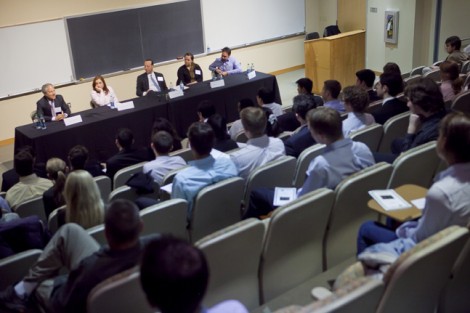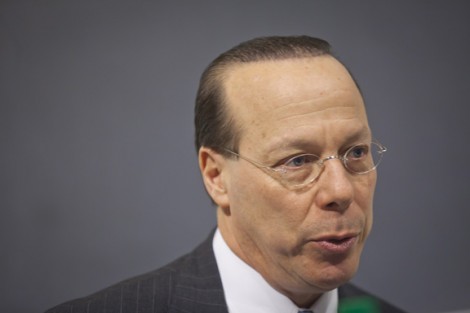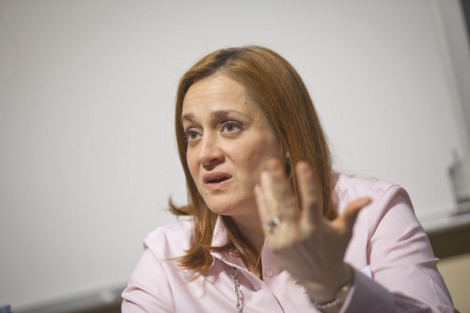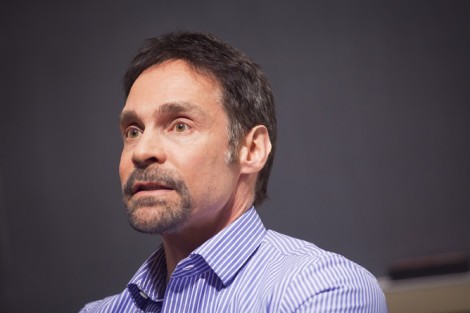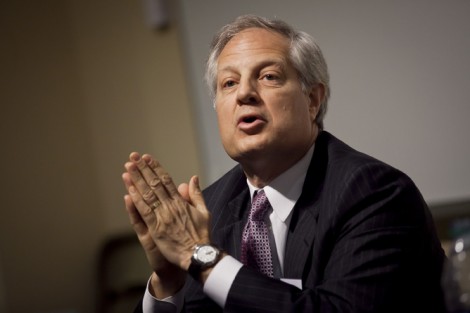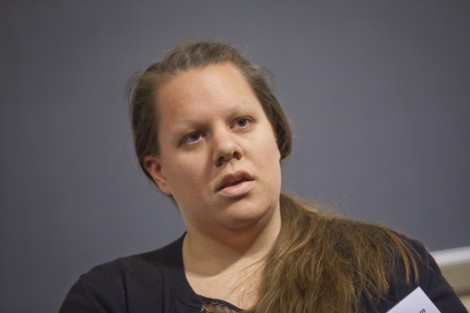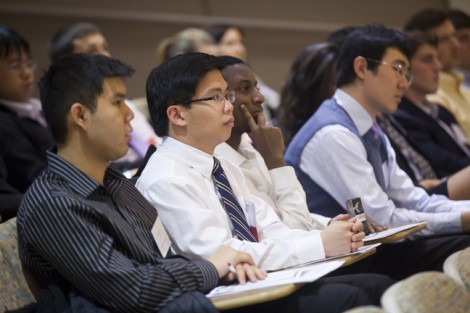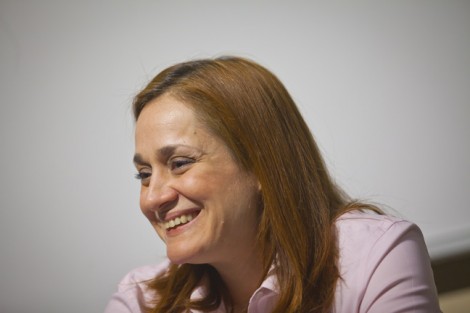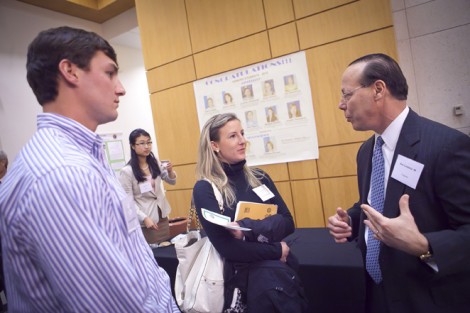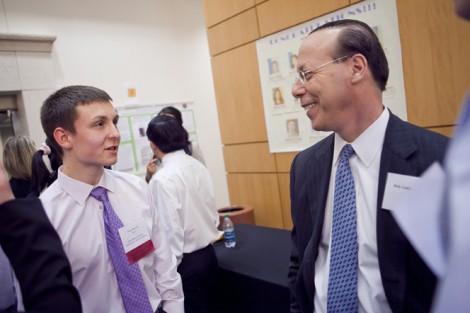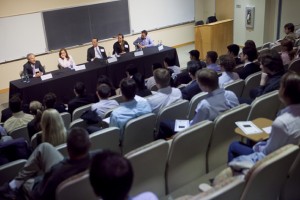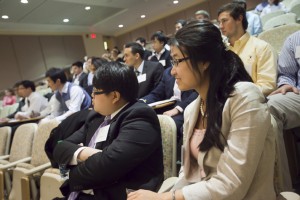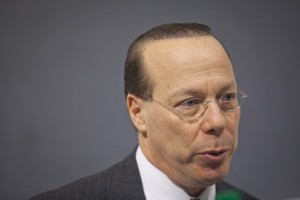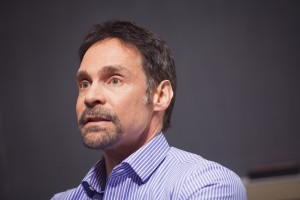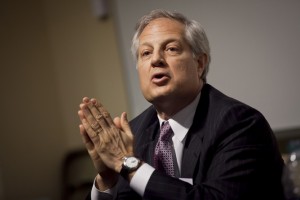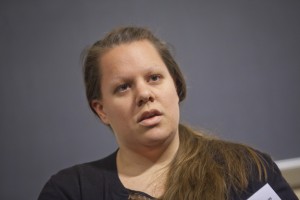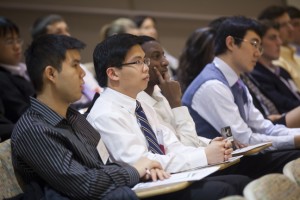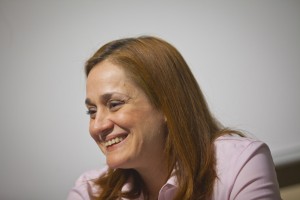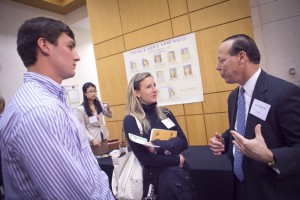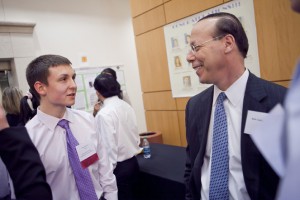Being prepared to answer probing and thoughtful questions about the financial world, the company where you are being interviewed, and your own professional aspirations are crucial aspects for a successful interview.
More than 50 students absorbed that prescription, which was just one part of the intense and pointed discussion provided during a spring semester Finance Alumni Panel, co-sponsored by Investment Club and Career Services.
Blagovest Baychev ’12, mathematics-economics major and president of Investment Club; Miao Wang ’12, mathematics major and treasurer of Investment Club, and Shiyang Jiang ’12, mathematics major, helped select panelists and handled publicity for the event, held in Oechsle Hall.
Panelists included Dana Stanzione Baber ’90, vice president, global securitized trading technology; J.P. Morgan; Rob Goldstein ’80, managing director, Citigroup; Robert Little ’80, managing director, dept capital markets, Bank of America Merrill Lynch; David Rappaport ’81, CEO and CCO, Investec USA Holdings Corp.; Samantha Speer ’09, analyst, equity research, machinery/engineering and construction team, Bank of America Merrill Lynch.
The group provided advice on how Lafayette students could best prepare themselves to obtain positions at their companies or other financial businesses. Goldstein emphasized the importance of preparing for the interview and being able to answer questions about their own experiences and motivations as well as about business and the financial world. In addition, he noted that they should be prepared to answer questions about the economy and to give their perspective on issues.
One panelist noted that financial companies normally only recruit at the traditional target schools for their profession, such as Harvard, Yale, Columbia, Cornell, MIT, Williams, Duke, etc. Students there are coached and prepared for their interviews. Rappaport acknowledged that this was true, but said, “target schools don’t impress me. You are the best. Go into your interviews knowing that. Be prepared and know about the company where you are being interviewed.” He added that even though he is a CEO, he looks at every résumé that comes from a Lafayette graduate.
Gain Unique Experience
Little agreed with all that the other panelists had said and added that an important part of the evaluation of candidates at his company is what they did after their senior year in high school and in the summers during College. “We look for activities and experiences that give us an idea about an individual’s personality,” he said. “We want to get a sense of who they are and what they are about, how they will fit in at the company.”
Goldstein agreed and added, “Sometimes I go through a stack of 1,000 resumes. It is the unique aspects that cause one to stand out from the rest. For example, we had one from a person who worked at a bicycle shop for six years during school. Make sure you include details that show you do more than just work and go to school.”
In describing what a typical day on the job is like, all the panelists said to be prepared for 14- to 16-hour days. “You can make six figures your first year but it is hard work,” said Goldstein. “Work will be your whole life for the first two years out of college.” Little told the students that if they planned to be an analyst to view it as a two- to three-year experience, not a career. “After that you move on to another firm or you go to graduate school,” he said.
Baber said it is important to have a clear focus on what you want and to interview only for that particular job. “Canvas a lot of places when you are trying to decide where to interview but then focus your résumé and your preparation to the specific company where you get the interview.”
She added: “What do you want to be in five years? You need to be ready to answer that question.”
Little advised students to take a job based on what it is and not on whether it is with a large, name-brand firm or a particular small firm. “You will get the experience you are seeking either way. Go for the best available job. Don’t choose it for the money or the name. Choose it because it is the right job for you,” he said.
Recommended Courses/Experiences
accounting, financial statement analysis, courses focused on writing and giving presentations, foreign language, leadership positions in extracurricular organizations, internship at a bank between junior and senior year, upper level mathematics, investments, forecasting
Listen to the full panel discussion
